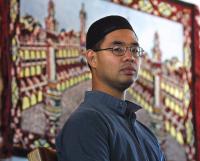Issue Date: October 17, 2003
Case against Army chaplain James Yee offers disturbing parallels to Los Alamos debacle By L. LING-CHI WANG As someone who organized Chinese Americans to protest the treatment of Wen Ho Lee -- the Los Alamos scientist accused of spying and who was later exonerated -- I already see parallel patterns emerging in the arrest of Capt. James J. Yee, a Muslim U.S. Army chaplain at Guantanamo Naval Base. The first similarity is the treatment of both men’s families. Yee’s surprise arrest by the FBI at the Naval Air Station in Jacksonville, Fla., reportedly on charges of espionage, left his wife completely in the dark. Whoda Yee waited, “extremely worried,” for hours at the Seattle-Tacoma airport and didn’t learn of her husband’s fate until a few days later. She has yet to speak with him. Wen Ho Lee and his relatives, friends, and colleagues across the country were kept in the dark for nine months as they endured an intimidating FBI investigation prior to Lee’s indictment on Dec. 10, 1999. Then, for nine more months, Lee was kept in solitary confinement in a federal detention facility in Santa Fe, N.M. Such inhumane and unconstitutional treatment is inexcusable. Second, the order to arrest Yee, according to The Washington Times, came from “the highest levels” of our government. That suggests a well-planned and calculated move on the part of the government to control and shape public perception of the case. In Lee’s case, the decision to indict him was made at a White House meeting that included National Security Adviser Sandy Berger, Attorney General Janet Reno, Energy Secretary Bill Richardson, CIA Director George Tenant and FBI Director Louis Freeh, among others. Exactly who participated in the decision to arrest Yee remains unknown. Third, as in the Wen Ho Lee case, the government has chosen to prosecute Yee first through the nation’s news media, primarily through leaks. As with Lee, government sources leaked the story to a newspaper -- this time, the extremely conservative and administration-friendly Washington Times. The timing of the leak appears to be strategic. Anti-Muslim sentiment still runs high since Sept. 11, 2001, and the Bush administration recently launched a high-profile campaign against China, which it blames for the loss of nearly 3 million jobs since Bush assumed the presidency (China’s undervalued currency is held responsible). Yee is both Chinese American and a Muslim. The cases of Yee and two other arrested Americans who worked at Guantanamo provide a clever diversion calculated to heighten Americans’ sense of vulnerability and further incite anti-Muslim and anti-Chinese sentiment at a time when many Americans and lawmakers in Congress are beginning to question Bush’s costly military occupation of Iraq. Yee was caught with “classified documents that may have included sketches or diagrams of Guantanamo’s high security prison Camp Delta, along with lists of detainees and their interrogators,” according to WABC reporter Cheryl Fiandaca and the Washington Times. But the true nature and contents of these “classified documents” has yet to be disclosed. During the Wen Ho Lee case, anonymous government sources went so far as to say that Lee had in his possession the “crown jewel” of the American nuclear arsenal, information that, if shared with America’s enemies, risked the lives of hundreds of millions of Americans. FBI agents later apologized in court for making such false statements to the media and to the court. So far, most media, perhaps having learned a lesson from the Wen Ho Lee case, are being more cautious. Yee has been described as a loyal American, a devout Muslim and a caring family man. We do not yet know precisely what Yee did or did not do in Guantanamo, or whether he did or was asked to do anything beyond his authorized religious duties. Nor do we know if he had uncovered unauthorized or even illegal information or activities at Guantanamo Bay. Either scenario could precipitate the harsh treatment he has been subjected to since Sept. 10. All Americans, however, are entitled to the rights guaranteed by the U.S. Constitution. Instead of engaging in prejudicial leaks, the government should disclose precisely its charges against Yee. The Yee leaks are just as bad as the disclosure of the identity of the CIA officer whose husband is former U.S. ambassador Joseph Wilson. Yee should be given competent legal representation, including civilian lawyers, throughout the investigation and trial. Politicians, especially Sen. Charles Schumer of New York, must stop their political grandstanding. Some are acting as if Yee has already been tried and pronounced guilty, when in fact he has yet to be charged with any violation of civil, criminal or military law. Wen Ho Lee was subjected to similar partisan political lynching for two years. He was unjustly smeared by FBI leaks and unproven allegations, and subjected to cruel and unusual punishment without a trial. His case ended with all serious charges against him being dropped and a rare apology from the court. Because Yee is both a Chinese American and a Muslim American, we need to be vigilant in defending his rights. Like all Americans, he must be considered innocent until proven guilty. L. Ling-chi Wang is professor of Ethnic and Asian American Studies at the University of California, Berkeley. National Catholic Reporter, October 17, 2003 |
